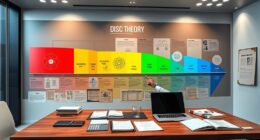Mastering the art of thoughtful responses enhances your communication and builds trust in relationships. Start by preparing and strategizing your answers. Anticipate questions to boost your confidence. Take a moment to gather your thoughts before you respond. Use active listening to validate the other person's feelings and ask clarifying questions to uncover their concerns. Pay attention to your body language, ensuring it aligns with your words. When discussions get tough, maintain professionalism and respect. With these techniques, you'll create a respectful atmosphere that encourages open dialogue. Discover more ways to refine your responses and make connections that matter.
Key Takeaways
- Take a moment to gather your thoughts before responding to ensure clarity and coherence in your answers.
- Actively listen to the other person, validating their feelings and fostering a deeper connection.
- Ask clarifying questions to uncover underlying concerns and ensure mutual understanding.
- Maintain alignment between your body language and verbal messages to enhance communication effectiveness.
- Provide options and solutions to promote constructive dialogue and a sense of direction in conversations.
Importance of Effective Communication

Effective communication isn't just about exchanging information; it's about creating clarity and demonstrating character. When you communicate effectively, you foster trust and understanding, opening doors to deeper relationships.
Your tone and delivery can deescalate tension, helping to maintain a calm environment. It's essential to address misunderstandings promptly, as this shows integrity and respect.
In challenging situations, your responses to tough questions should reflect professionalism, maintaining a respectful demeanor even when emotions run high. By being courteous, you encourage reciprocity from others, creating a more collaborative atmosphere. Additionally, understanding the greatest happiness principle can guide your responses in a way that considers the collective good.
Preparation and Strategic Thinking

Building on the foundation of effective communication, preparation and strategic thinking play an essential role in enhancing your responses. Anticipating potential questions before conversations helps you feel more confident and reduces anxiety.
Organize your thoughts and familiarize yourself with common tough questions. Practicing your responses not only boosts your confidence but also helps you maintain composure during challenging discussions. Researching relevant topics guarantees you provide informed answers, and using factual support strengthens your position.
Aim for short, specific responses to keep your communication focused and clear. By preparing strategically, you'll be better equipped to handle unexpected queries, allowing you to navigate conversations with poise and clarity, ultimately leading to more productive exchanges. Additionally, employing technical SEO tools can provide insights that enhance your preparation by identifying potential areas of improvement in your content strategy.
Techniques for Thoughtful Responses

Mastering thoughtful responses requires a blend of preparation and mindfulness during conversations. Start by taking a moment to gather your thoughts before you reply. This pause can help you formulate a clearer answer.
Monitor your body language, ensuring it aligns with your words for consistent communication. If a question seems unclear, don't hesitate to reword it for clarity. Request additional time if you need it—there's no rush.
Acknowledge the other person's emotions to validate their feelings, which fosters a respectful atmosphere. Identify key parts of the question to address and ask clarifying questions to uncover underlying motives.
Engaging With the Other Person

Engaging with the other person is essential in any conversation, and it often happens when you actively listen and respond to their concerns. By allowing them to guide the dialogue, you create a space for open communication. Show your willingness to address their emotions and acknowledge their questions; this builds trust and fosters understanding. Additionally, practicing active listening can significantly enhance your ability to connect with others on a deeper level.
Here's a quick reference table to enhance your engagement strategy:
| Technique | Purpose | Example |
|---|---|---|
| Active Listening | Validate their feelings | Nodding and maintaining eye contact |
| Encouraging Dialogue | Promote open conversation | "Tell me more about your thoughts." |
| Acknowledging Emotions | Show empathy | "I can see this is important to you." |
| Providing Options | Offer clarity | "Would you like to discuss this or another topic?" |
| Linking Responses | Create relevance | "As we discussed, this relates to your earlier concerns." |
Managing Difficult Situations

Steering through difficult situations in conversations can feel overwhelming, but you can maintain control by recognizing when a dialogue becomes unproductive.
If you sense the conversation is escalating without resolution, don't hesitate to disengage professionally. You might say, "I'd prefer not to discuss this right now." This approach preserves your dignity and keeps the atmosphere respectful.
Pay attention to nonverbal cues; they can signal when it's time to shift topics. Humor, when used appropriately, can also lighten the mood and reset the conversation. Just remember, timing is key. Additionally, employing active listening techniques can help clarify misunderstandings and promote a more constructive dialogue.
Enhancing Clarity and Focus

Effective communication thrives on clarity and focus, which are essential for successful interactions. To enhance these qualities, start by organizing your thoughts before responding. Anticipate potential questions and practice concise answers that directly address the topic.
When speaking, use specific language to avoid misunderstandings and guarantee your message remains on point. Reword questions if necessary to clarify the intent before answering. Taking a moment to collect your thoughts can also help maintain clarity.
Monitor your body language to guarantee it aligns with your verbal messages, reinforcing your points. Finally, don't hesitate to ask clarifying questions to deepen understanding. By implementing these techniques, you'll foster a more effective dialogue that promotes clearer communication. Additionally, consider the impact of air purification technology on creating a healthier environment for discussions, as clean air can enhance cognitive function and focus.
Building Trust Through Responses

Clarity and focus in communication lay a strong foundation for building trust between individuals. When you respond thoughtfully, you demonstrate respect and integrity, fostering a safe space for dialogue.
Your tone and delivery matter; they can either escalate tension or create a calm environment. By acknowledging emotions and validating the other person's feelings, you show that you care.
Take a moment to gather your thoughts, ensuring your response is clear and concise. Anticipating tough questions can help you prepare, reducing anxiety.
Remember, using specific examples and factual support strengthens your answers and enhances credibility. Establishing clear boundaries can also be vital for maintaining respect in the conversation.
Ultimately, engaging openly and honestly invites trust, allowing relationships to flourish and communication to thrive.
Frequently Asked Questions
How Do I Handle Silence During Conversations?
Handling silence during conversations can feel uncomfortable, but it's a natural part of communication.
Instead of rushing to fill the space, take a moment to gather your thoughts. You can use this time to reflect on what's been said or ask open-ended questions to encourage the other person to share more.
What Role Does Empathy Play in Responses?
Empathy plays an essential role in your responses. When you acknowledge another person's feelings, it fosters a deeper connection and shows that you care.
It helps you tailor your response, making it more relevant and understanding. By actively listening and validating their emotions, you create a supportive environment.
This approach not only enhances communication but also builds trust, encouraging open dialogue and collaboration, which can lead to more productive conversations.
How Can I Improve My Listening Skills?
To improve your listening skills, focus on being present during conversations. Avoid distractions and make eye contact to show engagement.
Practice active listening by summarizing what the speaker says, which helps confirm your understanding. Ask clarifying questions when needed, and resist the urge to interrupt.
Also, be mindful of your body language; it should reflect openness. Finally, show empathy by acknowledging the speaker's feelings, which fosters deeper connections.
What Are the Signs of Effective Communication?
Effective communication shows clear signs, like active listening, where you engage and respond to others.
You'll notice a respectful tone and open body language, both promoting a positive atmosphere.
When conversations flow smoothly, misunderstandings diminish, and trust builds.
You also recognize when emotions are acknowledged, which validates feelings.
Finally, clarity in responses and the ability to ask clarifying questions demonstrate your commitment to understanding and connecting with the other person.
How Does Body Language Impact Responses?
Body language greatly impacts your responses. When you maintain eye contact and use open gestures, you convey confidence and engagement, making your message clearer.
Conversely, crossed arms or avoiding eye contact might suggest defensiveness or disinterest, which can undermine your message.
By aligning your nonverbal cues with your verbal communication, you enhance understanding and connection.
Conclusion
To summarize, mastering thoughtful responses isn't just a skill; it's essential for building strong relationships. Research shows that 93% of communication effectiveness comes from non-verbal cues and how you respond. By preparing strategically and engaging actively, you can enhance your interactions and foster trust. Remember, each response shapes your connection with others, so embrace this opportunity to elevate your communication. With practice, you'll navigate even the toughest conversations with confidence and grace.
Eugene brings a fresh, dynamic voice to our platform as one of our talented Writers. Specializing in research-driven content, he explores the latest findings in psychology and personal growth, translating them into actionable insights for our readers. Eugene’s work is fueled by a curiosity about what makes us tick and a desire to help others unlock their potential.










